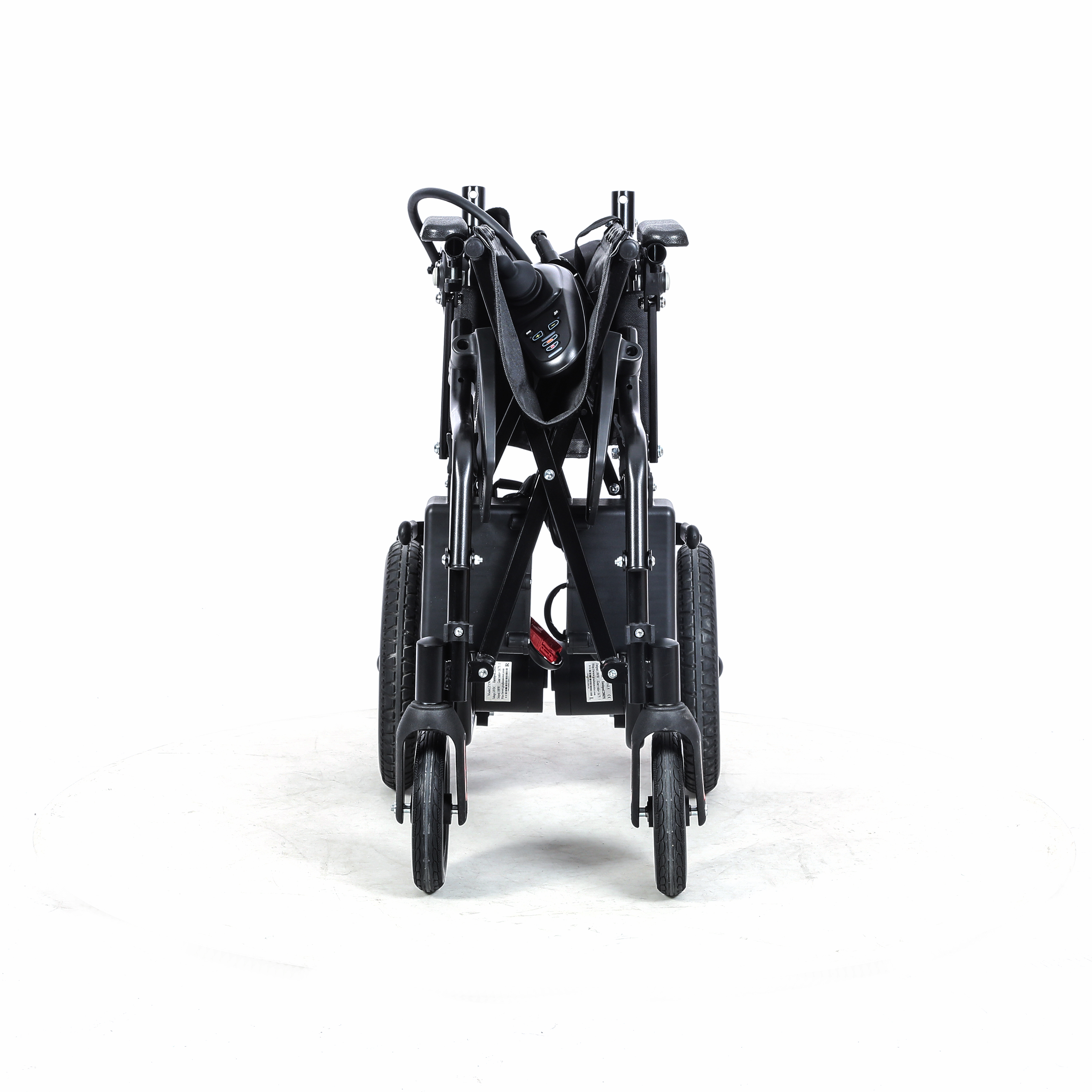If you’re considering purchasing an electric wheelchair, one of the most important factors to consider is weight. Whether you are a distributor, reseller, or a customer looking to purchase one, the weight of an electric wheelchair can affect its transportability, usability, and overall convenience. Understanding how much electric wheelchairs weigh and what influences their weight can help you make an informed decision.
In this article, we’ll break down the different weight categories of electric wheelchairs, explore the factors contributing to their weight, and offer insights into choosing the right model based on weight. We’ll also discuss the practical aspects of weight when using, transporting, or storing an electric wheelchair.
What Are the Weight Ranges for Electric Wheelchairs?
The weight of an electric wheelchair can vary significantly depending on its type and features. Generally, electric wheelchairs weigh between 33 lbs and 300 lbs, with various models falling into distinct categories:
Lightweight Electric Wheelchairs: 33-50 lbs
Lightweight models are designed for portability and ease of transport. These wheelchairs typically weigh between 33 and 50 pounds. While these are often foldable and ideal for short trips or occasional use, they are not meant for heavy daily use. These wheelchairs are best for those who need a chair for occasional mobility or light transportation needs.
Although lightweight electric wheelchairs are ideal for traveling or brief outings, they typically don’t have as many advanced features, such as reclining or standing capabilities. Additionally, insurance may not cover these models, as they’re often deemed suitable only for occasional use rather than long-term daily use.
Standard Electric Wheelchairs: 51-150 lbs
Most standard electric wheelchairs fall into this category, weighing between 51 and 150 lbs. These models are suitable for regular, everyday use, offering better seating options, more powerful batteries, and additional features. They are often used by individuals who need a chair for daily mobility but may need help with transportation.
These wheelchairs provide a good balance between functionality and portability. Many come with features such as adjustable footrests, better cushioning, and a higher weight capacity, making them suitable for a variety of users.
Heavy-Duty Electric Wheelchairs: 150-300 lbs
For users with higher weight capacity needs, bariatric electric wheelchairsfall into this category, weighing anywhere from 150 lbs to nearly 300 lbs. These models are designed to support individuals with higher weight limits, often up to 600 lbs, and typically include reinforced frames and larger motors. Due to their weight, these wheelchairs require special transport equipment like ramps or vehicle lifts for transportation.
Heavy-duty wheelchairs are essential for individuals who need a more robust chair for extended use. However, due to their size and weight, they may not be suitable for frequent travelers or those who need a chair that is easily transportable.

Why Are Electric Wheelchairs Heavier Than Manual Wheelchairs?
One of the main reasons why electric wheelchairs are heavier than manual wheelchairs is the presence of batteries. The battery is the primary source of weight in an electric wheelchair, and depending on the model, it can add a significant amount of weight.
Batteries
A single battery can weigh anywhere from 15 lbs to 50 lbs, and some wheelchairs use two batteries for longer power runs. While the battery adds significant weight, it also provides the crucial function of powering the chair’s motors, enabling the user to move independently without assistance. Some lightweight models may use smaller batteries to keep the overall weight down, but this comes at the expense of battery life and range.
Add-Ons and Features
In addition to batteries, additional features and accessories can also add weight to an electric wheelchair. Common add-ons include:
● Swing-away footrests
● Elevating leg rests
● Storage baskets or bags
● All-terrain tires
● Advanced seating systems (e.g., reclining, elevating, or standing options)
Each of these features adds additional pounds, but they can significantly improve the wheelchair’s comfort and functionality.
Seating and Positioning Systems
More advanced seating and positioning systems increase the weight of electric wheelchairs. Features like reclining seats, tilting mechanisms, or even powered standing capabilities contribute to the overall weight. These features are typically found in higher-end models designed for people with specific mobility needs.
Practical Considerations for Weight
When choosing an electric wheelchair, weight should be a key consideration based on how you plan to use and transport it.
Transporting Your Wheelchair
If you plan on traveling frequently or need to take your wheelchair in and out of a vehicle, the weight will be an important factor. Lightweight, foldable wheelchairs are easy to transport in a car trunk or on public transport, while heavier models may require lifts or ramps.
Storing Your Wheelchair
If you have limited storage space, such as in a small apartment or a vehicle, the weight will also determine how easily you can store your wheelchair. Heavy-duty models require more space and may not be as easy to store in small areas.
Comfort vs. Portability
While lighter models may offer more portability, they often compromise on comfort and features. Conversely, heavier models provide advanced features and a higher weight capacity but may not be as easy to move or transport. It’s essential to strike a balance between the chair’s features and your need for portability.
Conclusion
The weight of an electric wheelchair plays a crucial role in determining its functionality, portability, and overall user experience. From lightweight models weighing as little as 33 lbs to heavy-duty models approaching 300 lbs, there is a wide range of options to meet various needs. Whether you’re purchasing for yourself or your business, understanding how weight impacts the use and transport of the wheelchair is essential.
At Guangzhou Topmedi Co., Ltd., we offer a range of high-quality electric wheelchairs that provide the perfect balance of weight, functionality, and comfort. Our products are designed with durability and ease of transport in mind, making them ideal for any business or consumer in need of reliable mobility solutions.
FAQ
Q: What is the weight range of an electric wheelchair?
A: Electric wheelchairs typically weigh between 33 lbs and 300 lbs, depending on the type and features.
Q: Why are electric wheelchairs heavier than manual wheelchairs?
A: Electric wheelchairs are heavier due to the batteries and additional features like advanced seating systems and accessories.
Q: Are lightweight electric wheelchairs suitable for long-term use?
A: Lightweight electric wheelchairs are best for short-term or occasional use, as they may not have the durability or features for long-term use.
Q: Can electric wheelchairs be transported in a car?
A: Yes, lightweight and foldable models can be easily transported in a car, while heavier models may require ramps or lifts.
























